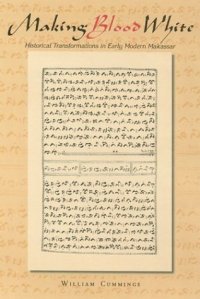
Ebook: Making Blood White: Historical Transformations in Early Modern Makassar
Author: William Cummings
- Year: 2002
- Publisher: University of Hawaii Press
- Language: English
- pdf
The significance Makassarese accorded written histories was derived from their perceptions of language as a powerful force and the belief that written manuscripts were essentially sacred objects worthy of veneration and protection. Makassarese viewed their histories not as representations of the past, but as preservations of a past still alive, relevant, and immediate to the present. This positioned the arrival of literacy and the spread of written history-making to have decisive effects on early modern Makassar. Cummings traces these effects by analyzing concurrent developments in three interrelated areas. Socially, written histories were vital in the creation of a new, increasingly hierarchical social formation based on a fundamental distinction between white- (noble) and red-blooded (commoner) descent. Politically, new narratives of the past displaced older ones, and in so doing established the kingdom of Gowa as the center of Makassarese society. Culturally, the presence of historical manuscripts was influential in creating the idea that Makassarese possessed a "culture," which could be defined and to which they could refer.
Finally, Cummings considers the implications this volume has for the study of the past in early modern Southeast Asia and beyond. He offers an assessment of the predominant way historians perceive the study of this region and time and suggests an approach that promises to enrich and extend not only our understanding of the past, but of how the past might be better approached in the histories we make.
Making Blood White bears in important ways on the historiography of Southeast Asia in general and will be read by students of the region's history and anthropology as well as by those interested in the relationships of history, literacy, and politics in premodern Asia.